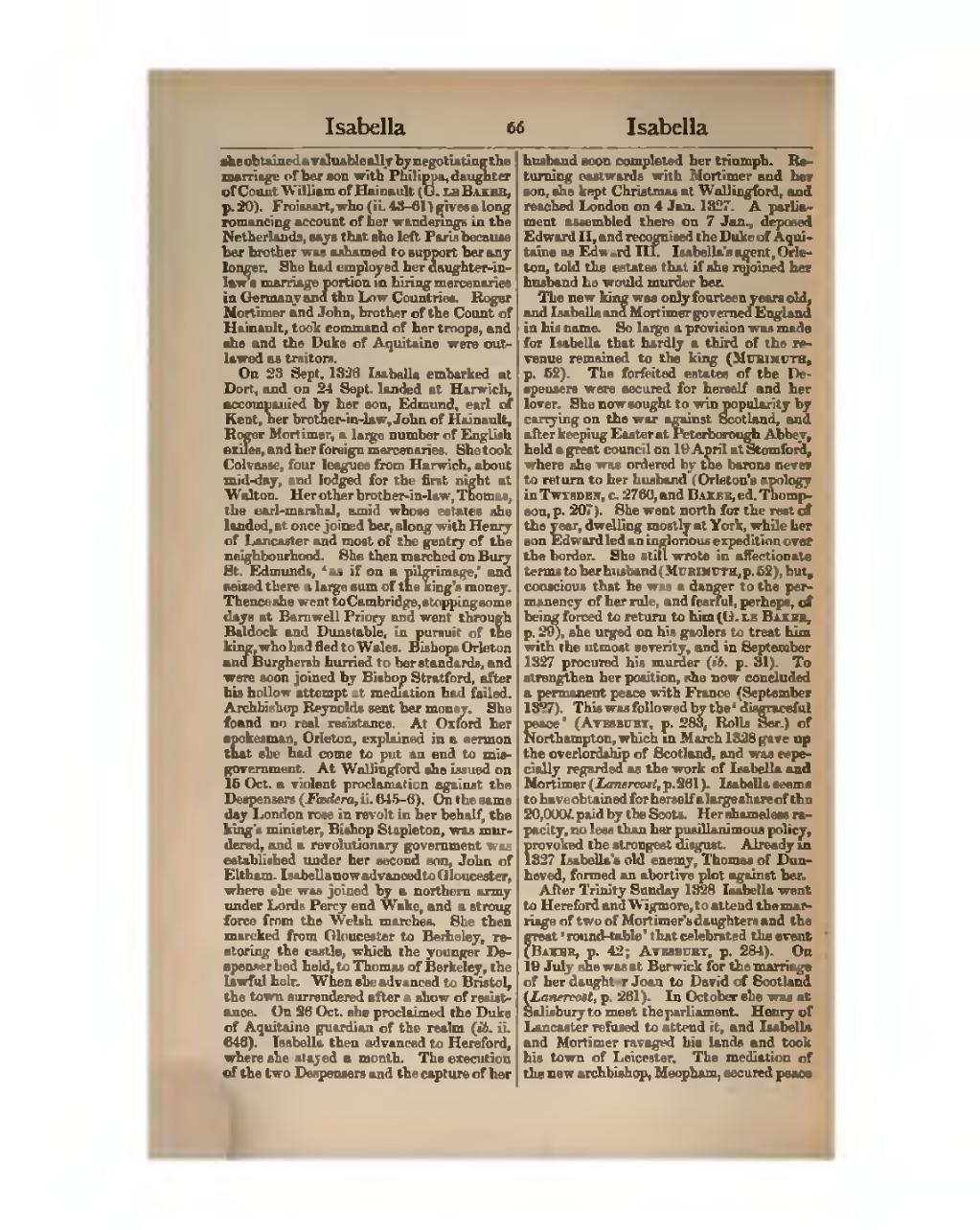she obtained a valuable ally by negotiating the marriage of her son with Philippa, daughter of Count William of Hainault (G. le Baker, p. 20), Froissart, who (ii. 43-61) gives a long romancing account of her wanderings in the Netherlands, says that she left Paris because her brother was ashamed to support her any longer. She had employed her daughter-in-law's marriage portion in hiring morcenaries in Germany and the Low Countries. Roger Mortimer and John, brother of the Count of Hainault, took command of her troops, and she and the Duke of Aquitaine were outlawed as traitors.
On 23 Sept. 1326 Isabella embarked at Dort, and on 24 Sept. landed at Harwich, accompanied by her son, Edmund, earl of Kent, her brother-in-law, John of Hainault, Roger Mortimer, a large number of English exiles, and her foreign mercenaries. She took Colvosse, four leagues from Harwich, about mid-day, and lodged for the first night at Walton. Her other brother-in-law, Thomas, the earl-marshal, amid whose estates she landed, at once joined her, along with Henry of Lancaster and most of the gentry of the neighbourhood. She then marched on Bury St. Edmunds, 'as if on a pilgrimage,' and siezed there a large sum of the King's money. Thence she went to Cambridge, stopping some days at Barnwell Priory and went through Baldock and Dunstable, in pursuit of the king, who had fled to Wales. Bishops Orleton and Burghersh hurried to her standards, and were soon joined by Bishop Stratford, after his hollow attempt at mediation had failed. Archbishop Reynolds sent her money. She found no real resistance. At Oxford her spokesman, Orleton, explained in a sermon that she had come to put an end to misgoverenment. At Wallingford she issued on 15 Oct. a violent proclamation against the Despensers (Fœdera, ii. (645-6). On the same day London rose in revolt in her behalf, the king's minister. Bishop Stapleton, was murdered, and a revolutionary government was established under her second son, John of Eltham. Isabella now advanced to Gloucester, where she was joined by a northern army under Lords Percy and Wake, and a strong force from the Welsh marches. She then marched from Gloucester to Berkeley, restoring the castle, which the younger Despenser had held, to Thomas of Berkeley, the lawful heir. When she advanced to Bristol, the town surrendered after a show of resiststance. On 26 Oct. she proclaimed the Duke of Aquitaine guardian of the realm (ib. ii. 646). Isabella then advanced to Hereford, where she stayed a month. The execution of the two Despensers and the capture of her husband soon completed her triumph. Returning eastwards with Mortimer and her son, she kept Christmas at Wallingford, and reached London on 4 Jan. 1327. A parli ment assembled there on 7 Jan., deposed Edward II, and recognised the Duke of Aquitaine as Edward III. Isabella's agent, Orleton, told the estates that if she rejoined her husband he would murder her.
The new king was only fourteen years old,and Isabella and Mortimer governed England in his name. So large a provision was made for Isabella that hardly a third of the revenue remained to the king (Murimuth, p. 52). The forfeited estates of the Despensers were secured for herself and her lover. She now sought to win popularity by carrying on the war against Scotland, and after keeping Easter at Peterborough Abbey, held a great council on 19 April at Stamford, where she was ordered by the barons never to return to her husband (Orleton's apology in Twysden, c. 2766, and Baker, ed. Thompson, p. 207). She went north for the rest of the year, dwelling mostly at York, while her son Edward led an inglorious expedition over the border. She still wrote in affectionate terms to her husband(Murimuth, p.52), but conscious that he was a danger to the permanency of her rule, and fearful, perhaps, of being forced to return to him (G. le Baker, p. 29), she urged on his gaolers to treat him with the utmost severity, and in September 1327 procured his murder (ib. p. 31). To strengthen her position, she now concluded a permanent peace with France (September 1327). This was followed by the 'disgraceful peace' (Avesbury, p. 283, Rolls Ser.) of Northampton, which in March 1328 gave up the overlordship of Scotland, and was especially regarded as the work of Isabella and Mortimer (Lanercost, p. 261). Isabella seems to have obtained for herself a large share of the 20,000l. paid by the Scots. Her shameless rapacity. no less than her pusillanimous policy provoked the strongest disgust. Already in 1327 Isabella's old enemy, Thomas of Dunheved, formed an abortive plot against her.
After Trinity Sunday 1328 Isabella went to Hereford and Wigmore, to attend the marriage of two of Mortimer's daughters and the great 'round-table' that celebrated the event, (Baker, p. 42; Avesbury, p. 284). On 19 July she was at Berwick for the marriage of her daughter Joan to David of Scotland (Lanercost, p. 261). In October she was at Salisbury to meet the parliament. Henry of Lancaster refused to attend it, and Isabella and Mortimer ravaged his lands and took his town of Leicester. Tha mediation of the new archbishop, Meopham, secured peace
